MARCH
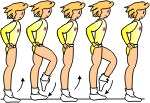
Description :
- Leg is bending in front of body: Hip and knee flexion.
- Ankle shows clear movement, toe-ball-heel.
- Total movement is upwards, not downwards.
- Upper body is erect with neutral spine, natural alignment.
- Upper body shows core strength, no co-movement upwards-downwards or forwards-backwards.
- Amplitude: From neutral position to full plantar flexion of ankle, 30-40 oflexion in hip and knee
JOG
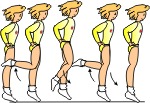
- Lower leg is lifted maximally backwards to the gluteus.
- Neutral hip or slight hip flexion or extension (+/- 10 o).
- Knee flexion.
- Ankle is showing plantar flexion at top position.
- Feet show controlled movement, landing toe-ball-heel.
- Upper body is erect with neutral spine, natural alignment.
- Amplitude: Neutral position to 0-10 o hip extension, 110-130 o knee flexion, full plantar flexion
SKIP
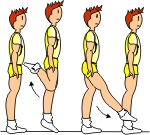
- Skip starts as a jog with hip extension, knee flexion and heel backwards to the gluteus to set of a low kick with hip flexion of 30-45 o and full knee extension to 0 o - a skip.
- Movement is seen in both hip and knee.
- Muscle control is shown through all of the movement. Lower leg is stopped by the quadriceps.
- Upper body stays erect with neutral spine, natural alignment.
- Amplitude: From neutral hip to 30-45 o flexion, from full knee flexion to complete extension
KNEE LIFT
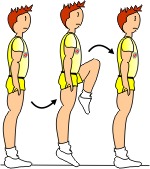
- Working leg shows a high degree of flexion in hip and knee, minimum 90o flexion in both joints.
- When thigh of moving is at the top position, the lower leg is vertical, with ankle plantar flexion.
- Elevated Ankle can be dorsal or plantar flexed but muscle control must show.
- Standing leg is straight, maximum knee/hip flexion is approx. 10 o.
- Upper body stays erect with neutral spine, natural alignment.
- Amplitude: From neutral position to minimum 90 o flexion in hip and knee of working leg.
KICK
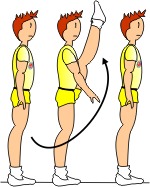
- Straight leg high kick, minimum amplitude: heel at shoulder height, approx. 145o.
- Only movement is hip flexion. Leg is straight – knee joint is showing no movement.
- Ankle is plantar flexed throughout movement.
- Standing leg stays straight, maximum knee/hip flexion approx 10o.
- Upper body stays erect with neutral spine, natural alignment.
- Amplitude: From neutral position to 150-180o hip flexion in working leg. Knee shows full extension throughout movement.
JACK
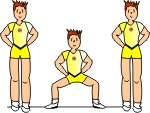
- A hop out and in with legs bending. Natural outwards rotation in hip joint.
- Landing is with feet further than shoulder width apart, knees and feet point outwards.
- Controlled but powerful take off and landing. Precise and controlled movement of ankle and foot – toe-ball-heel action.
- Hopping in: Feet/heels together, toes point forward (preferred) or outward.
- Upper body is erect with neutral spine, natural alignment.
- Amplitude: From neutral position to approx shoulder width plus 2 foot lengths apart with 25-45o flexion in hip/knees (more if in super low or low with grand plié position)
LUNGE
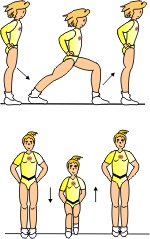
- Legs/feet start together or shoulder width apart, no outward rotation at hip. One leg is extended (without locking the knee) backwards in the sagittal plane.
- Heels are lowered with control.
- Feet stay in sagittal plane. Whole body moves (side to side) as a unit.
- Low impact: Body slightly forward (front leg is weight bearing), straight line from neck to heel.
- High impact: Legs are hopping, alternating, in the sagittal plane in a cross county skiing motion.
- Amplitude: Approx. 2-3 feet apart in sagittal plane. (Lunge variations = different amplitudes).






